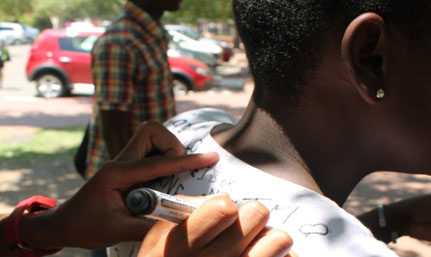|

|
|
A student writes the name of a friend who has been a victim of rape, on the T-shirt worn by Mody Motholo – Former SRC interim president.
Photo: Jerry Mokoroane
14 February 2013 |
“I am morally tied to stop rape”, students say
Kovsie student and former SRC Interim President Mody Motholo is creating awareness about rape with a campaign called “I am morally tied to stop rape”.
As part of the campaign Mody chained herself to a tree on the Bloemfontein Campus to show how many of our students and women are living in bondage as a result of this type of crime. Students walking past the campaign station interacted with Mody, who informed them about the rape issues affecting students across our country and how we can join hands to stop the increasing cases of rape, both reported and not reported.
Students could also write down the names of victims on her T-shirt, which will later be used as an indication of this terrible crime in our country. “The first name written on this T-shirt was that of the latest reported rape case, namely Anene Booysen who was brutally gang raped.
"Within an hour this T-shirt was covered in names, which was an indication to me of the seriousness of the problems some students who are victims of rape are struggling with around our campus,” said Mody.